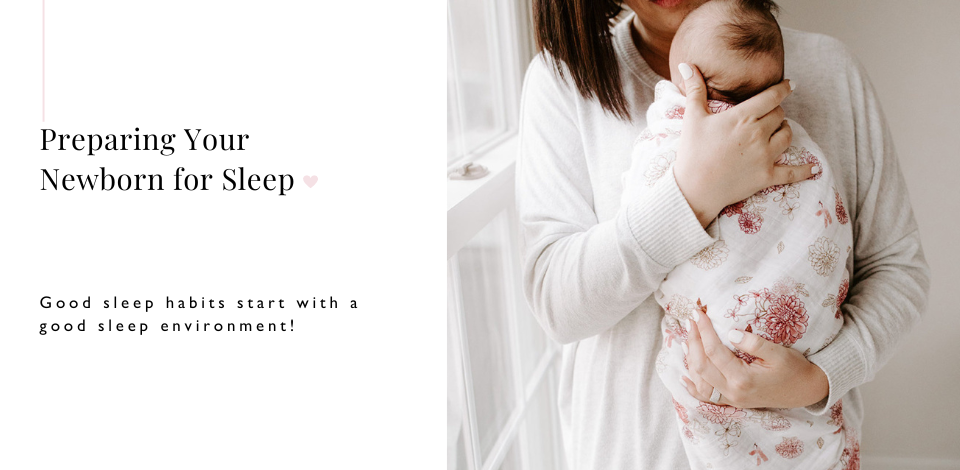Preparing Your Newborn For Sleep
Jump to Section

There are many things you can do, even before your baby is born, to set up a positive sleep environment and to educate yourself on newborn sleep and what to expect. Interested in knowing what do to encourage your newborn to develop healthy sleep habits? Well, it starts by making sure that baby’s sleep environment is set up to support quality sleep and safe sleep.
Baby’s Sleep Environment
Parents with a newborn baby at home are tired, that’s totally understandable. However, one common mistake new parents make, is that in order to get those few extra hours of sleep, they are willing to do whatever it takes to help their baby fall back to sleep. That may mean changing baby’s sleep environment half way through the night or throwing in a stuffed animal to occupy baby when they wake. What parents have to remember, is that when it comes to baby’s sleep environment, keeping things as simple as possible is always best.
Creating a Safe Environment:
- It is common to think that a warmer temperature is better for baby, but a cooler bedroom is actually more inviting for sleep. If you’re worried about your baby getting cold at night, you can use a sleepsack which is a wearable blanket.
-
The darker the bedroom, the better – even a sliver of light creeping in from the edges of a curtain is enough to wake up a sensitive sleeper during their sleep cycle transitions. Black out blinds, or even garbage bags on the window, can make a significant difference in baby’s ability to fall asleep and stay asleep.
-
All you need is a crib, a certified safe mattress, and a fitted crib sheet, that's it. Remove all blankets and pillows. If you are concerned about your baby being cold, layer them accordingly with clothing and a sleep sack, as mentioned above. A pillow should not be introduced into your child’s sleep environment until they are 18 months of age. Stuffed animals and lovey’s can pose as a suffocation hazard, so it’s best to remove them from your baby’s crib until one year of age. Lastly, padded bumpers and sleep positioners are not necessary.
Understanding Newborn Sleep
What can also prove to be essential for success, is when new parents take time to learn about newborn sleep and what baby is capable of. Newborn babies are growing and processing so much, that they simply can’t stay awake for very long periods of time. It is important for new parents to know that they can’t expect sleep patterns for a while, and that this is totally okay! Sleep patterns will take time to evolve and will begin around 14 – 16 weeks.
Encourage your baby to get the sleep they need (about 14-18 hours a day) and do what you can to ensure they are sleeping in a safe sleep environment. As mentioned, at this age you can’t expect sleep patterns yet, they just aren’t ready, so don’t worry about creating bad habits. Know that there will plenty of time to start to develop healthy sleep habits at the three to four-month mark.
Remember, every baby is different. Just because your friend’s baby slept through the night at five weeks, but your baby isn’t, doesn’t mean that you’re doing something wrong.
Practice Encourages Progression
Remember that at this stage, both you and your baby are still getting to know each other and there will naturally be a steep learning curve. It is never too early to start creating a sleep routine that involves songs, stories and cuddles – these are wonderful things to start building positive associations for sleep. Don’t get discouraged when it comes to newborn sleep. Making it through the newborn phase isn’t easy. Be sure you are also making your own sleep a priority, so that you are better prepared to handle the challenges and surprises that come with being a new parent!
